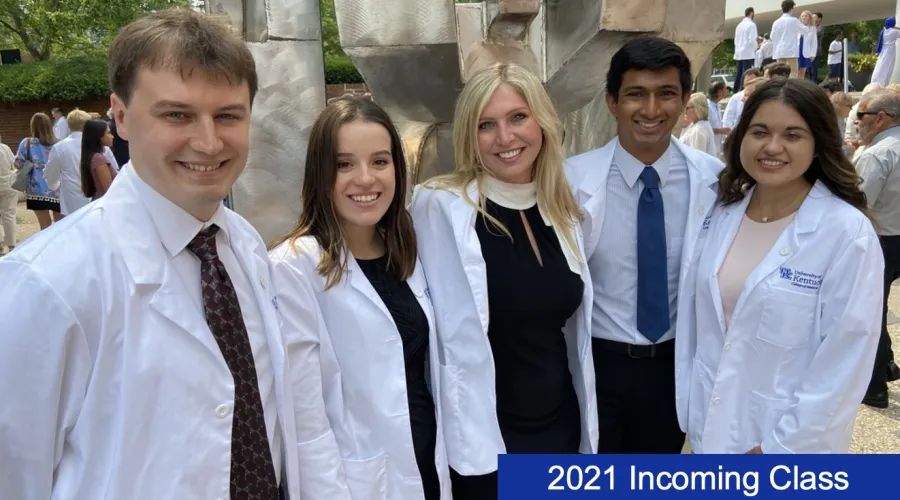Medical School M1 and M2

Medical School
M1 and M2
From the College of Medicine Office of Medical Education
Medical school training follows the Kentucky Integrated Curriculum
Pre-Clinical Years - The first two years of study introduce students to the primary disciplines of biomedical science integrated with the clinical approach to health and disease. UK was one of the first medical schools to adopt block scheduling, which provides an intensive, concentrated exposure to each content area.
First Year - First year develops an integrated understanding of biomedical concepts that are central to the study of medicine and launches the organ system-based curriculum.
Clinical Anatomy: This course presents an integrated approach to the core gross and microscopic anatomy within the clinical context. Students will correlate basic anatomy into the interpretation of both radiologic images and physical examination findings. This course builds a foundation for the understanding of human anatomy essential to the remainder of the medical curriculum.
Foundations of Infection, Disease and Therapeutics: This course outlines the basis of all human disease, integrating the core disciplines of biochemistry, molecular biology, genetics, microbiology, immunology, pharmacology, and pathology. This course provides the foundational knowledge that will be built upon in the subsequent systems-based courses.
Organ System-Based Curriculum: The remaining courses will build upon the foundations created in the first two courses to provide an integrated understanding of health and disease within the body’s organ systems. Students will understand the normal structure and function of the following systems, and apply that knowledge to differentiate between the various disorders of each system and appropriately choose a management approach to both diagnosis and treatment.
- Neurosciences: neuroanatomy, neurophysiology, neurology, ophthalmology, otolaryngology, and neurosurgery
- Behavioral Basis of Medicine: psychiatry and behavioral science
- Hematologic & Lymphatic: hematology and oncology
- Musculoskeletal & Integumentary: gross anatomy, orthopedics, rheumatology, and dermatology
Introduction to Clinical Medicine: Longitudinal course throughout the year to provide students with the knowledge, skills, and attitudes necessary to practice patient-centered and evidence-based care in today’s health care environment. Students will develop their medical interviewing and counseling skills through focused standardized patient interactions. In small-group seminars facilitated by behavioral and clinical faculty preceptors, core topics such as medical ethics, professionalism, healthcare disparities and sociocultural aspects of health care will be discussed.
First-Year Distinguishing Features
- Early introduction to medical interviewing and examination skills.
- Patient-centered approach to learning the basic sciences.
- All foundational science courses co-directed by a basic scientist and a clinician.
- Block scheduling.
Second Year - Second year expands the understanding of health and disease through a systems-based approach to the study of medicine.
Organ System-Based Curriculum: Most second-year courses will continue to develop an integrated understanding of health and disease within the body’s organ systems. Students will understand the normal structure and function of each system, and apply that knowledge to differentiate between various disorders affecting that system and appropriately choose a management strategy to both diagnosis and treatment.
- Renal & Urinary: nephrology and urology
- Cardiovascular: cardiology, cardiothoracic surgery, and vascular surgery
- Respiratory: allergy, otolaryngology, pulmonology, and cardiothoracic surgery
- Gastrointestinal & Nutrition: gastroenterology, general surgery, and nutrition
- Endocrine & Reproductive: endocrinology, gynecology, obstetrics, and neonatology
Contemporary Practice of Medicine: This course provides the foundation for successfully working in the current and future medical system. Integrating together public health, health policy and evidence-based medicine, students will develop a thorough understanding of our health care system and the approaches that will ultimately improve health care outcomes for patients.
Advanced Clinical Medicine: Serving as a bridge between the basic and clinical sciences, student will apply the concepts learned in their prior courses to advance their clinical reasoning. Students will also develop the critical communication skills for their clinical years, from appropriately focusing their history and physical exam to succinctly presenting patient findings.
Multisystem & Integrative Concepts: This course serves as the capstone course for the organ system-based curriculum. Primarily a clinical case-based course, students will formulate their own differential diagnoses and plan of care and check their conclusions against the actual approach of master clinicians. Through the application and review of knowledge within clinical cases, the course will prepare students well for USMLE Step 1.
Second-Year Distinguishing Features
- Systems-based approach to the study of medicine.
- Concentrated curriculum on evidence-based clinical decision-making.
- Capstone course for USMLE and clerkship preparation.
- Focus on contemporary issues in health care systems and finances as they affect medical practice.